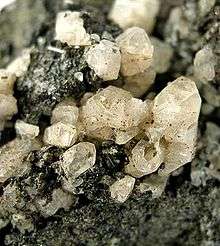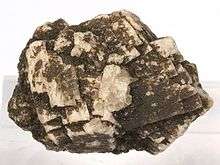Anorthite
| Anorthite | |
|---|---|
 | |
| General | |
| Category | Feldspar |
| Formula (repeating unit) | CaAl2Si2O8 |
| Strunz classification | 9.FA.35 |
| Crystal system | Triclinic |
| Crystal class |
Pinacoidal (1) (same H-M symbol) |
| Space group | P1 |
| Unit cell |
a = 8.1768, b = 12.8768 c = 14.169 [Å]; α = 93.17° β = 115.85°, γ = 92.22°; Z = 8 |
| Identification | |
| Formula mass | 278.20 g·mol−1 |
| Color | White, grayish, reddish |
| Crystal habit | Anhedral to subhedral granular |
| Twinning | Common |
| Cleavage | Perfect [001] good [010] poor [110] |
| Fracture | Uneven to concoidal |
| Tenacity | Brittle |
| Mohs scale hardness | 6 |
| Luster | Vitreous |
| Diaphaneity | Transparent to translucent |
| Specific gravity | 2.72–2.75 |
| Optical properties | Biaxial (-) |
| Refractive index | nα = 1.573–1.577 nβ = 1.580–1.585 nγ = 1.585–1.590 |
| Birefringence | δ = 0.012–0.013 |
| 2V angle | 78° to 83° |
| Melting point | 1553 °C[1] |
| References | [2][3][4] |
Anorthite is the calcium endmember of the plagioclase feldspar mineral series. The chemical formula of pure anorthite is CaAl2Si2O8. Anorthite is found in mafic igneous rocks. Anorthite is rare on the Earth[5] but abundant on the Moon.[6]
Mineralogy

Anorthite is the calcium-rich endmember of the plagioclase solid solution series, the other endmember being albite, NaAlSi3O8. Anorthite also refers to plagioclase compositions with more than 90 molecular percent of the anorthite endmember. At 1 atmosphere, anorthite melts at 1553 °C.[1]
Occurrence
Anorthite is a rare compositional variety of plagioclase. It occurs in mafic igneous rock. It also occurs in metamorphic rocks of granulite facies, in metamorphosed carbonate rocks, and corundum deposits.[2] Its type localities are Monte Somma and Valle di Fassa, Italy. It was first described in 1823.[4] It is more rare in surficial rocks than it normally would be due to its high weathering potential in the Goldich dissolution series.
It also makes up much of the lunar highlands; the Genesis Rock is made of anorthosite, which is composed largely of anorthite. Anorthite was discovered in samples from comet Wild 2, and the mineral is an important constituent of Ca-Al-rich inclusions in rare varieties of chondritic meteorites.
See also
References
| Wikimedia Commons has media related to Anorthite. |
- 1 2 J.R. Goldsmith (1980): The melting and breakdown reactions of anorthite at high pressures and temperatures. Am. Mineralogist. 65, 272-284, http://www.minsocam.org/ammin/AM65/AM65_272.pdf
- 1 2 Handbook of Mineralogy
- ↑ Mindat
- 1 2 Webmineral
- ↑ Deer, W.A., Howie, R.A. and Zussman, J. (1966). An Introduction to the Rock Forming Minerals. London: Longman. p. 336. ISBN 0-582-44210-9.
- ↑ "Significant Lunar Minerals" (PDF). In Situ Resource Utilization (ISRU). NASA. Retrieved 23 August 2018.